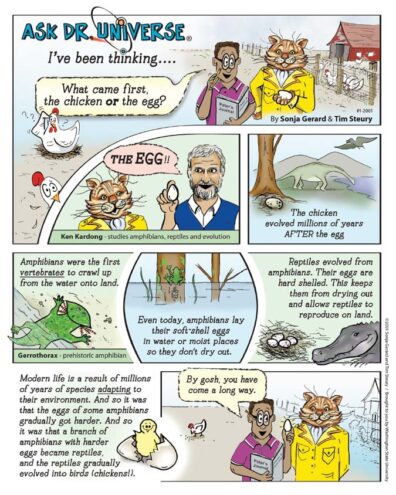Subscribe to Dr. Universe’s weekly e-mail
Sign-up for the weekly e-newsletter to get the latest answers, activities, and videos!
The Latest Questions and Answers
Ask Dr. Universe Podcast |
Your Paw-some Question | Will vaccines always hurt?

Cosmo and I learn about shots—and new technology our friend WSU’s Roland Chen is working on to make painless vaccines.
- Learn more about microarray patches
- Find out how vaccines work with the Amoeba Sisters and why we get vaccines with SciShow Kids
- Check out how other vaccine technology gets rolled out, from Ted-Ed
Sound effects courtesy Zapsplat and Pixabay
As always, submit burning questions at askdruniverse.wsu.edu. Who knows where your questions will take us next.
APPLE PODCASTS
SPOTIFY
STITCHER
-
Why does the Earth have lava in the middle?
Dear Nora,
I live near a few volcanoes. One of them—Mount St. Helens—is bubbling with molten material that will probably gush out as lava someday.
I asked my friend Johannes Hämmerli about lava. He’s an earth scientist at Washington State University.
He told me Earth is mostly solid.
“The very center of Earth is a solid metal ball,” Hämmerli said. “Outside that ball, there’s a thick shell we think is liquid. And the rest of Earth—if you go through the mantle and crust—is pretty much solid.”
Earth formed when a cloud of dust in space collapsed. The elements inside the cloud squished … » More …
Read Story -
How was the Earth made?
Dear Penny,
Blue oceans, green forests, a cozy blanket of oxygen. Our planet is a super comfy home. It’s hard to imagine there was ever a time it didn’t exist.
I asked my friend Julie Ménard how Earth formed. She’s a planetary scientist at Washington State University.
She told me it started with the Big Bang. That was nearly 14 billion years ago.
“The Big Bang is not an explosion,” Ménard said. “It’s an expansion. Everything in our universe today was in a tiny spot—smaller than the eye can see. Eventually, the pressure and density got so high that it started to expand.”
… » More …
Read Story -
Why are giraffes’ tongues purple?
Dear Winona,
When I was a kitten, I visited a drive through zoo. A giraffe slithered its long, purple tongue through the open car window and licked my face.
It was awesome.
It turns out dark colors come from a pigment called melanin. That melanin makes a giraffe’s tongue purple, blue or black.
I asked my friend Cynthia Cooper about melanin. She studies pigments—the colorful stuff in animal cells—at Washington State University.
She told me melanin is also why human skin gets darker from being in the sun.
<img width="396" height="661" loading="lazy" class="wp-image-8364 alignleft" src="https://s3.wp.wsu.edu/uploads/sites/2332/2026/02/giraffe-396x661.jpg" alt="A giraffe stands tall and stretches its neck to grab foliage ... » More …
Read Story -
Why do dairy cows produce so much milk compared to beef cows?
Dear Kristen,
This answer is fueled by coffee with a splash of milk from a dairy cow.
I asked my friend Kimberly Davenport why my morning milk doesn’t come from a beef cow. She’s an expert in cow genetics at Washington State University.
She told me that all cows are the same species: Bos taurus. But different kinds of cows have different traits—like making lots of milk or growing big muscles.
“Over time, we’ve selected these cows to either make more milk or more meat,” Davenport said.
Selecting means noticing the traits you like and keeping animals with those traits. When those animals reproduce, … » More …
Read Story -
Where does all the snow go after winter?
Dear Bobo,
There’s nothing more magical than sparkly flakes gently falling on a fluffy blanket of snow. But it’s a temporary kind of magic. When it warms up, the snow disappears.
I asked my friend Jennifer Adam what’s going on. She’s a water scientist at Washington State University.
She told me snow is frozen water. When temperatures rise, it melts. The solid frozen water turns back into liquid water.
That melted-snow water works just like rain water. It soaks into the ground. It fills up the spaces between bits of underground soil and rock. That’s the water that plants slurp up with their … » More …
Read Story -
How did big cats change into house cats?
Dear Morgan,
Like me, lions and tigers have sharp teeth and retractable claws. They sometimes use those fierce claws to knead or make biscuits. They enjoy a nap and good grooming sesh.
That’s not surprising because house cats share about 95% of their DNA with big cats. All cats belong to the family Felidae.
But that family is complicated. I asked my friend Haden Kingrey how house cats came to be. He’s an anthropology doctoral student at Washington State University. He studies artifacts to understand the past.
Kingrey told me that house cats are the result of evolution and domestication.
In any group of … » More …
Read Story -
How do scientists know the mass and size of planets?
Dear Lucy,
When I go to the veterinarian, they measure how big I am. They use a scale to check my weight. They find my length and height with a measuring tape.
But nobody can put a planet on a scale. Or wrap a measuring tape around it.
I asked my friend Katie Cooper about it. She’s a geologist at Washington State University. She studies our planet and other planets, too.
She told me we send satellites to orbit our solar system. When a satellite swoops around a planet, it snaps pics and takes measurements. Those images and measurements help scientists estimate the … » More …
Read Story -
What came first, the chicken or the egg?
Dear Friends,
I get amazing questions from curious kids all over the world. So many of you want to know whether chickens or eggs came first.
It turns out, that’s one of the first questions I ever received—way back in 2001. A lot has changed since then. But a lot has stayed the same, including my answer, which was originally in the form of a comic.

To find out the answer, I read my notes from my late friend Ken Kardong, former zoologist at Washington State University.
… » More …
Read Story -
What determines the size and shape of someone’s belly button?
Dear Isana,
My belly button is a subtle scar on my tummy. It’s covered by fluffy cat fur—and it’s not easy to see. But humans have obvious belly buttons. They come in different sizes and shapes.
I asked my friend Cindy Brigham-Althoff about that. She’s a nurse midwife and professor at Washington State University. She teaches student nurses about birth.
She told me the scientific name for a belly button is umbilicus. It’s what’s left of your umbilical cord.
Before you were born, a temporary organ called the placenta grew next to you. A cord connected the placenta to a spot in the … » More …
Read Story -
How many volcanoes are in the world?
Dear Garrett,
On very clear days, I can see five volcanoes from my campus. They’re Rainier, Hood, Adams, St. Helens and Baker. That’s…a lot.
I asked my friend Katie Cooper about it. She’s a geophysicist at Washington State University.

Check out the view of Mt. St. Helens from the … » More …
Read Story
